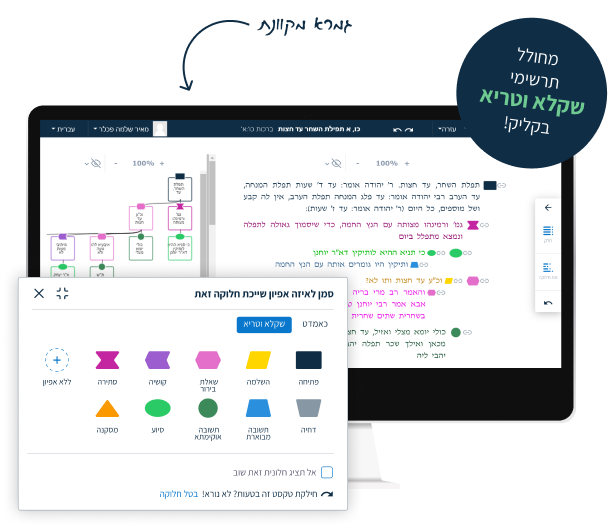
I watch football on Sunday, and I’m on the train at 7:15 every day to get to work. He made his first siyum on Shas at age 29, getting up and telling everyone, “I’m a regular guy. daf at the Agudah of Avenue H, recording the shiur on cassette tape to review later on the train.

Committing to a morning daf yomi seemed like the best way to make sure learning wouldn’t become a casualty of day-to-day life, and Yossi began attending the 5:20 a.m. Yossi started learning daf yomi in the early days of their marriage when their first child was on the way, and the writing on the wall indicated that the time had come for him to start working.

His wife Estie notes wryly that he’s not naturally a morning person. shiur at Rabbi Bergman’s shul in Flatbush and then making his way over to Rabbi Sherer’s shul immediately after Shacharis for round two. Yossi Gleiberman has a double dose of daf yomi, giving the 5:40 a.m.
#Gemara ispeak full
“It’s like having a suitcase full of diamonds, and when those diamonds are yours, they aren’t heavy at all.” “We think that sacrifice has to come with misery, but this is a thing of joy,” she observes. Zissy wholeheartedly disagrees with the idea that having a husband doing the daf is a burden on the family. It puts the stamp of Torah on the entire day.” There is so much beauty in seeing that this is how he starts his day. “My kids wake up in the morning and see their father coming in after the shiur. “There’s so much joy in our house because of daf yomi,” she says. Zissy shares that there are days where even she knows the daf, as her husband sometimes listens to a shiur in the car as they drive home from a simchah. The aura of daf yomi permeates the entire Fried home. However, now I understand what it means to be getting up that early every day.” I woke up early every morning with him, but that was years ago. Zissy laughingly recalls the days when daf yomi first took root in her home, saying, “I did something crazy back then. “But support for us daf yomi women means relinquishing our husbands’ help or companionship at inconvenient times in an honestly supportive and encouraging manner.” “We thought that support means sacrificing, working hard while making do with little,” says Zissy. Zissy recalls the thoughts that swirled through her own head after her year in seminary as she and her friends prepared to marry learning boys. The Fried’s youngest child is four months old, and their oldest is just home from seminary in Eretz Yisrael. “It can get hectic when you’re nursing a baby, a toddler is just waking up, you have to get boys on the Shacharis bus, and you’ve been manning the house by yourself from the wee hours of the morning,” says Zissy. Zissy admits that sometimes things are more than a little crazy while her husband is out of the house. Take Lakewood resident Zissy Fried, whose husband, Chai Lifeline’s New Jersey director Rabbi Sruli Fried, wakes up at 4:30 a.m. Time and again, I hear how thrilled they are to move mountains so that the untold thousands who commit to learning the daf can have a shiur each and every day. While I expect to hear about all the sacrifices made by daf yomi wives, none of the women I speak to consider it a hardship to take on extra work so their husbands can give their daily shiur. As we approach the next siyum, I spoke with the devoted wives of the maggidei shiur to discover what it’s like for those holding down the fort back at home. There’s no doubt that daf yomi is a man-centric undertaking, but the Siyum HaShas was an accomplishment celebrated with overflowing hearts on both sides of the mechitzah. Dozens and dozens of girls came from summer camps in the Catskills to share in the simchas haTorah, one of whom told me that she was “dancing in her heart” in the ezras nashim while the men did the two-step shuffle down below on the stadium floor.

One woman told me she drove 11 hours from Detroit to MetLife because she wasn’t going to miss the siyum for anything in the world. Clearly steady precipitation wasn’t going to come between these n’shei chayil and the siyum. These women had spent years doing bedtime single-handedly and braving the morning rush on their own while their husbands were learning. I had the distinct pleasure of interviewing the women who showed up at MetLife Stadium for the 12th Siyum HaShas back in August 2012, hours of rain doing nothing to dampen their enthusiasm. Nearly a century later, daf yomi continues to unite the Jewish Nation and connect Jews to their Creator. On Rosh Hashanah 1923, Jews around the world sat down to learn Maseches Brachos - and daf yomi was launched.

But many of them couldn’t have done it without the equal devotion of their wives On January 1, 2020, tens of thousands of Jewish men will dance in a joyous celebration of the completion of Talmud Bavli.


 0 kommentar(er)
0 kommentar(er)
